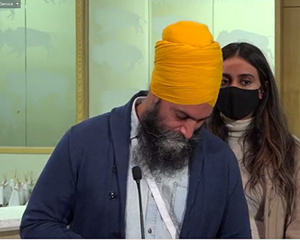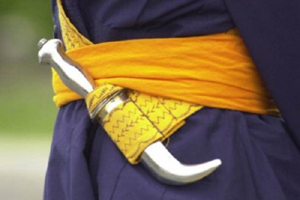
Friday August 20, 2021 | NATIONAL
by Mary P Brooke, Editor | Island Social Trends
NDP leader Jagmeet Singh visited the Cowessess First Nation in Saskatchewan this morning, which is Day 6 of the 44th federal election campaign. An interesting interruption and series of delays to scheduled media availabilities were experienced due to inclement weather.
It’s been barely a few months that Canadians have started to deal with the range of issues, problems and impacts of sorting out and hopefully moving forward from the painful history and now legacy of the Indian Residential Schools in Canada.
Emotional and spiritual impact:
Singh had a highly emotional moment in today’s press conference. After having visited the grave site area, he obviously felt deeply the truth of what happened in Cowessess and at that burial ground area at the former Mareival Residential School. Especially as he is soon to be a parent himself, he was struck with the horror of having one’s child or children taken from them and never knowing what happened to them.
When asked today how he felt being at the burial site, Singh needed about 30 seconds to compose himself, being clearly in emotional pain. “It’s not about me being a parent. What this means (is that) … a country killed its own people. It’s about Indigenous people being denied justice, being denied dignity.”

Jagmeet and his wife Gurkiran (who is somewhat far along in her first pregnancy, yet taking on the tough slog of an election campaign trail), meditated on how ‘we are all one’, when at the burial grounds of the former Mareival Residential School, he told media. He gave a brief explanation of how ‘fighting for justice’ is part of his Sikh faith, and briefly explained why he carries with him a kirpan (a symbol of fighting for justice).
Today Singh gifted his federal-politics kirpan to Cowessess Chief Cadmus Delorme. He said it was hard to part with that kirpan — as he’s carried it with him through most of his ‘federal political journey’m but that it was an important way to express and confirm his commitment to the Indigenous fight for justice.
Taking the legal approach:
“This is a painful and ongoing legacy. We can’t look away from this trauma. We have a responsibility to fight for justice,” said Singh in today’s media conference. He hopes that Canadians will not soon forget the burial sites issue, that it doesn’t become ‘old news’ so to speak.
“This was a crime that was committed against Indigenous people,” he said, adding that (with the wrinkle of his career training as a lawyer) it “should be prosecuted like a crime”. “We would appoint a special prosecutor and make sure it is prosecuted.”
He said the NDP would also work to fully implement all outstanding recommendations of the Truth and Reconciliation Commission report, including those that establish a National Council for Reconciliation to monitor and report on progress.
Dealing with the trauma:
Singh gave an articulate explanation of what it’s like to feel trauma, and more importantly, how that trauma is passed through to children and grand children. If that sort of pain has not been personally experienced it’s very hard to imagine it, he explained. He understands and briefly explained the connection to problems with housing and poverty. The NDP ‘Ready for Better’ commitments document includes a housing plan for and by Indigenous communities in urban areas, not just on reserves, said Singh.
The NDP leader said that today was about having another reminder to continue to fight for justice.
Background:
In June, Cowessess announced it had located 751 unmarked gravesites on the grounds of the former Marieval Indian Residential School site.
It later became one of the first Indigenous communities to gain jurisdiction of its children in care under federal law.
Singh arrived in Cowessess around 11 a.m. local time and shook hands with Chief Cadmus Delorme and band councillors. He then met privately with Delorme.



